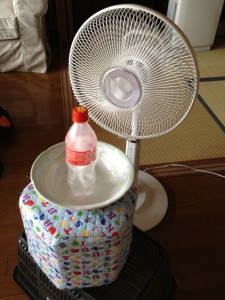life in Japan living in Japan materials personal technology
by sendaiben
2 comments
Summer tip: use a fan and ice instead of air conditioning
This post is dedicated to my friend Philip, ’cause he needs it right now 😉
This summer has been fairly mild in Sendai, but the last couple of weeks have been hotter. I don’t like air conditioning and prefer to use a combination of other strategies to stay cool outside of work. At home I wear as little as possible, sleep on bamboo sheets (one of the greatest inventions ever), and use an electric fan.
One way to make an electric fan more effective is to combine it with ice. This has two benefits: it takes some of the moisture out of the air through condensation and also lowers the temperature of the air slightly. You can see my setup in the picture above. A plastic bottle 2/3 full of water, frozen, a bowl to catch the condensation (this bottle accumulates a couple of centimeters of water in the bowl by the time it thaws out completely), and something to raise the bowl so that it is in front of the fan.
If you prepare three or four bottles you can rotate them fairly constantly and maintain a more pleasant environment without the expense, environmental damage, and air quality degradation of air conditioning.
Any other tips for the summer?
English speech contests
I have a new policy regarding English speech competitions (actually it’s an old policy, from earlier in the year) and I just wanted to make it public here along with the thinking behind it.
On many occasions in the past I have helped out with English speech contests and similar competitive events, as a coach, a judge, and even an organizer (the Miyagi Skit Koshien). However, I have never been completely comfortable with them, and recently have even begun to find them harmful.
I don’t believe competitive events are helpful to most language students. Yes, they can encourage students to spend a lot of time practicing, but the practice as it stands is not particularly useful (memorizing and repeating a speech ad nauseam). The winner-take-all nature of most contests is positive for the student that wins, and mostly negative for all the other students.
The sheer arbitrary nature of the judging decisions can make this worse (I have been on judging panels where students were disqualified because their school won the previous year, because it would be bad to give prizes to two students from the same school, or because one of the judges didn’t like the subject matter of their speech).
Add to this the strong suspicion I have that almost none of the students are writing their own speeches (and even if they do, they have no chance of winning), the disappointing contrast between the students when they are on stage giving their polished performance and after the event when they can’t seem to string two words together in English, and the slightly racist policies that bar students with non-Japanese family members (even non-English speaking ones!) from taking part and the whole circus just starts sitting wrong with me.
Finally, I don’t actually enjoy judging speeches and recitations. Some of the speeches can be interesting, but the pressure to rank the competitors and think of something intelligent to say in the final remarks takes away a lot of the pleasure.
Due to all of this, and because I haven’t found that taking part improves my life in any way, I will no longer be accepting invitations to be involved with competitive English events of any type.
However, I would like to see non-competitive events, like performance evenings or talent shows, become more widespread.
What do you think? Am I being too hasty in dismissing English contests?
blogging expectations Language learning materials online resources personal self-study
by sendaiben
2 comments
The daily practice
A short comment today. The concept behind this Bill Gates quote “most people overestimate what they can do in one year and underestimate what they can do in ten years” has been on my mind recently.
I’ve also seen it in my students’ and in my own life.
As one example, I recently started studying kanji again (you’d think I’d have this by now, after thirteen years in Japan) and have resolved to use Anki for 10-30 minutes in the morning each day before doing anything else. I have mostly kept on top of this and now after a couple of months I have done over six hours of focused kanji study*.
Doesn’t sound like much, but I am noticing the effects when reading and more importantly writing in Japanese.
The point is that seemingly insignificant daily habits can have a huge payoff. What are your daily habits?
*I’m using the Core 2000 and 6000 and JALUP RTK decks to study from.
What’s missing in education?
I got up before 5am today (summer here is rough on sleep) and started thinking about formal education and how it fails to educate people in the most important ways. There are three really important areas I feel formal schooling lets people down.
All of them are things that took me until my mid-30s to figure out, and I have had one of the best educations available -private school, famous university, and post-graduate study. I don’t remember any of these being addressed at any of my educational institutions, yet they are probably the most important things in terms of having a happy and productive life.
HEALTH
The importance of exercise, how to include exercise into your life, the benefits of lifting weights or doing bodyweight training, basic nutritional information, healthy and unhealthy diets, how to watch out for sugar (poison, basically), dangers of processed carbohydrates, benefits of protein and fats.
Being healthy through a combination of physical exercise and a balanced diet is the foundation to a happy life. It should be a core part of compulsory and continued education.
MONEY
How to budget, the power of interest (both on debt and savings), different investing options, the pros and cons of home ownership, how to use credit responsibly, how to build up savings and passive income, deferring purchases, how to think about money.
Being financially secure through an ’emergency fund’ of cash savings and having an income-producing portfolio of investments accumulated by saving every month won’t make you happy -but it will ensure that money problems do not make you unhappy.
GOAL-SETTING
Identifying things you want to achieve, breaking them down into manageable goals, doing self-directed research, and working consistently until completion are incredibly valuable skills.
We live in an age of increasing and decreasing opportunity. It is probably easier now than ever before for people to start small side businesses and have a shot at creating value for others and an income for themselves. At the same time, traditional employment where you get money in exchange for doing what you are told is shrinking alarmingly. All over the world young people are finding it harder and harder to find jobs that pay well and provide security.
An entrepreneurial mindset and the ability to set up and deal with your own projects is one way to provide employment security. Unlike in the past, setting up a side business in the age of the internet has minimal costs and little financial risk.
Conclusion
Now, I don’t think schools can magically teach these things to every student, thus leading to a utopian future where we are all healthy, financially responsible, productive members of society 🙂
However, I believe that giving every young person a solid grounding in the three areas above would at least give them a chance to build upon them later in life. At least when I went through school and university these things weren’t even touched upon.
My top recommendations for further reading: Mark Sisson (Mark’s Daily Apple) for health, Andrew Hallam (the Millionaire Teacher) for wealth, and Sebastian Marshall for productivity.
business expectations online resources personal technology websites
by sendaiben
3 comments
To Do Lists and Project Management: Trello
Recently I have been playing with a great free online resource called Trello that is designed to help teams work together on projects.
There are two main things I do on the site: manage my to do list and coordinate tasks within teams (one of colleagues at university and one at Cambridge English).
To Do List
In Trello I have a personal to-do list board. I have divided the board into four: today, this week, future, and waiting (I got this idea from Leo Babauta, who got it from Ryan Carson). I populate the future and this week lists as things come in, then move them to today every morning. So far it’s really helping me keep track of various things.
Coordinating Teams
You can also add other people to groups, and assign them to tasks. They can write notes on things, archive completed tasks, etc. It’s incredibly useful to delegating and sharing tasks.
Right now Trello consists of a website and apps for iOS and Android. The basic version is free, and there is a paid enterprise version as well (I don’t know what it does). I’ve used other productivity apps before, like Wunderlist, the iOS Reminders app, and Google Docs, but this has been the best one so far.
Please leave any software tips in the comments!




